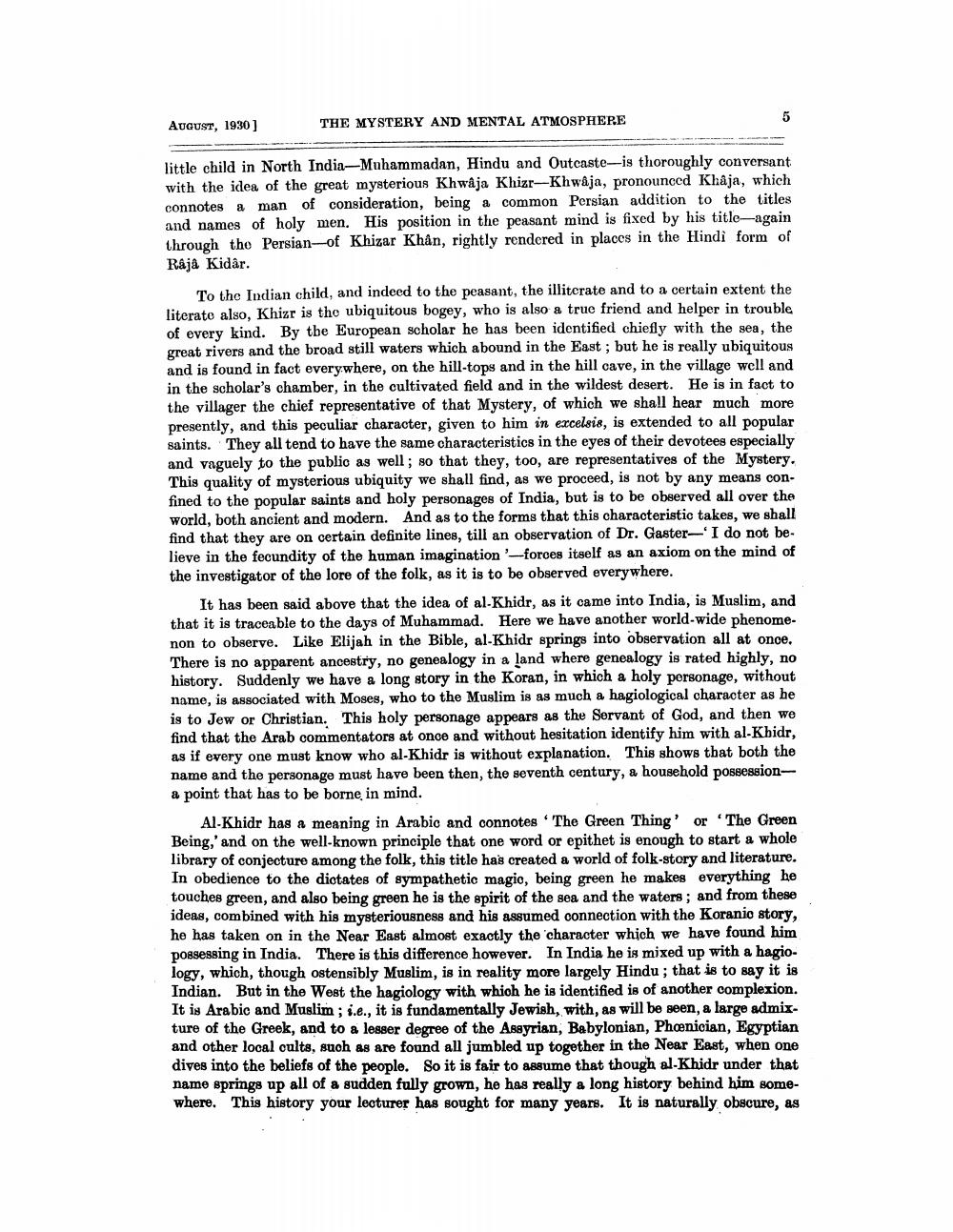________________
AUGUST, 1930 ]
THE MYSTERY AND MENTAL ATMOSPHERE
little child in North India-Muhammadan, Hindu and Outcaste-is thoroughly conversant with the idea of the great mysterious Khwaja Khirr-Khwaja, pronounced Khâja, which connotes a man of consideration, being a common Persian addition to the titles and names of holy men. His position in the peasant mind is fixed by his title-again through the Persian-of Khizar Khân, rightly rendered in places in the Hindi form of Raja Kidar.
To the Indian child, and indeed to the peasant, the illiterate and to a certain extent the literato also, Khizr is the ubiquitous bogey, who is also a true friend and helper in trouble of every kind. By the European scholar he has been identified chiefly with the sea, the great rivers and the broad still waters which abound in the East; but he is really ubiquitous and is found in fact everywhere, on the hill-tops and in the hill cave, in the village well and in the scholar's chamber, in the cultivated field and in the wildest desert. He is in fact to the villager the chief representative of that Mystery, of which we shall hear much more presently, and this peculiar character, given to him in excelsis, is extended to all popular saints. They all tend to have the same characteristics in the eyes of their devotees especially and vaguely to the public as well ; so that they, too, are representatives of the Mystery. This quality of mysterious ubiquity we shall find, as we proceed, is not by any means confined to the popular saints and holy personages of India, but is to be observed all over the world, both ancient and modern. And as to the forms that this characteristic takes, we shall find that they are on certain definite lines, till an observation of Dr. Gaster-'I do not believe in the fecundity of the human imagination '--forces itself as an axiom on the mind of the investigator of the lore of the folk, as it is to be observed everywhere.
It has been said above that the idea of al-Khidr, as it came into India, is Muslim, and that it is traceable to the days of Muhammad. Here we have another world-wide phenomenon to observe. Like Elijah in the Bible, al-Khidr springs into observation all at once. There is no apparent ancestry, no genealogy in a land where genealogy is rated highly, no history. Suddenly we have a long story in the Koran, in which a holy personage, without name, is associated with Moses, who to the Muslim is as much a hagiological character as he is to Jew or Christian. This holy personage appears as the Servant of God, and then we find that the Arab commentators at once and without hesitation identify him with al-Khidr, as if every one must know who al-Khidr is without explanation. This shows that both the name and the personage must have been then, the seventh century, a household possessiona point that has to be borne in mind.
Al-Khidr has a meaning in Arabic and connotes The Green Thing' or 'The Green Being,' and on the well-known principle that one word or epithet is enough to start a whole library of conjecture among the folk, this title has created a world of folk-story and literature. In obedience to the dictates of sympathetic magio, being green he makes everything he touches green, and also being green he is the spirit of the sea and the waters, and from these ideas, combined with his mysteriousness and his assumed connection with the Koranio story, he has taken on in the Near East almost exactly the character which we have found him possessing in India. There is this difference however. In India he is mixed up with a hagiology, which, though ostensibly Muslim, is in reality more largely Hindu ; that is to say it is Indian. But in the West the hagiology with whioh he is identified is of another complexion. It is Arabic and Muslim; s.e., it is fundamentally Jewish, with, as will be seen, a large admixture of the Greek, and to a lesser degree of the Assyrian, Babylonian, Phoenician, Egyptian and other local cults, such as are found all jumbled up together in the Near East, when one dives into the beliefs of the people. So it is fair to assume that though al-Khidr under that name springs up all of a sudden fully grown, he has really a long history behind him somewhere. This history your lecturer has sought for many years. It is naturally obscure, as




